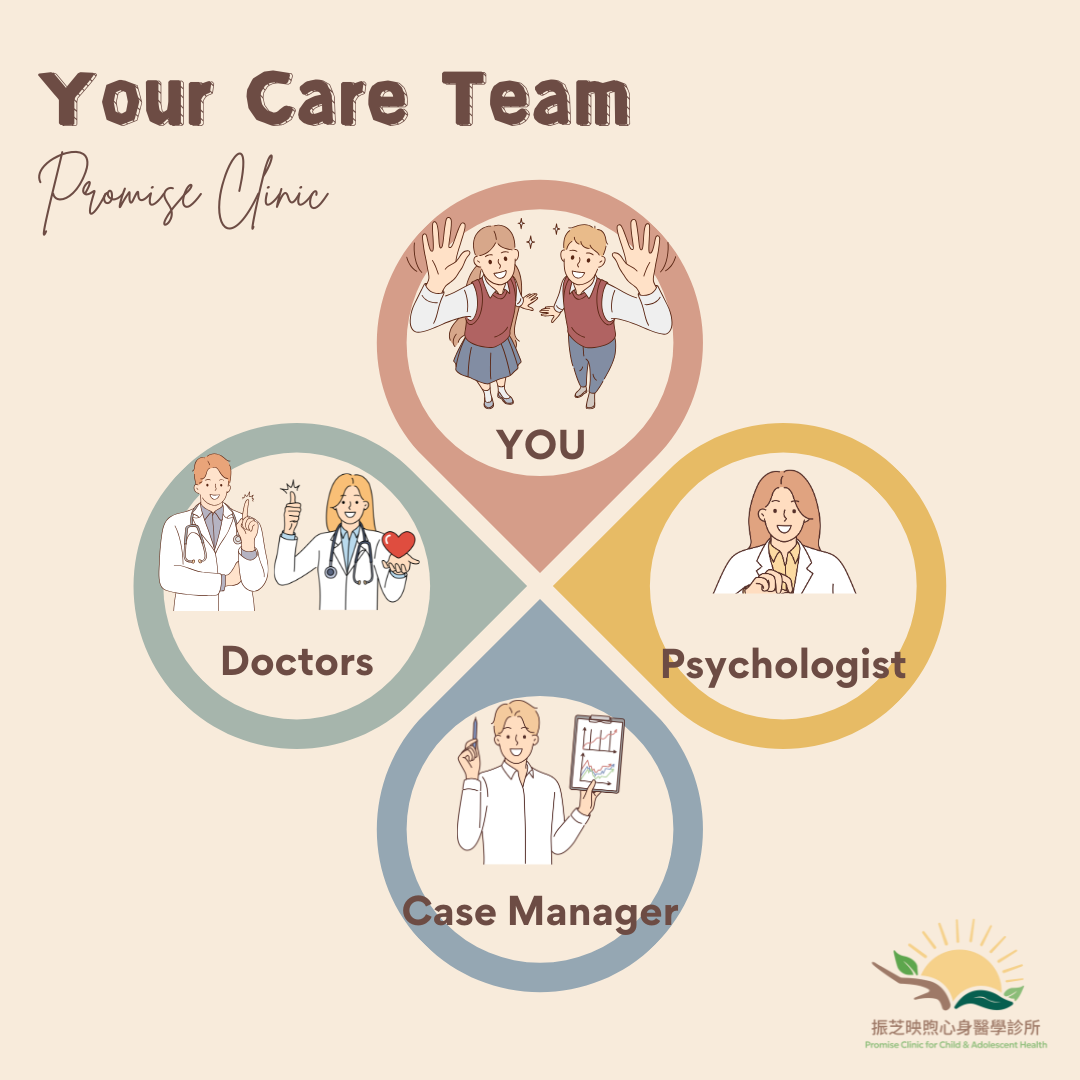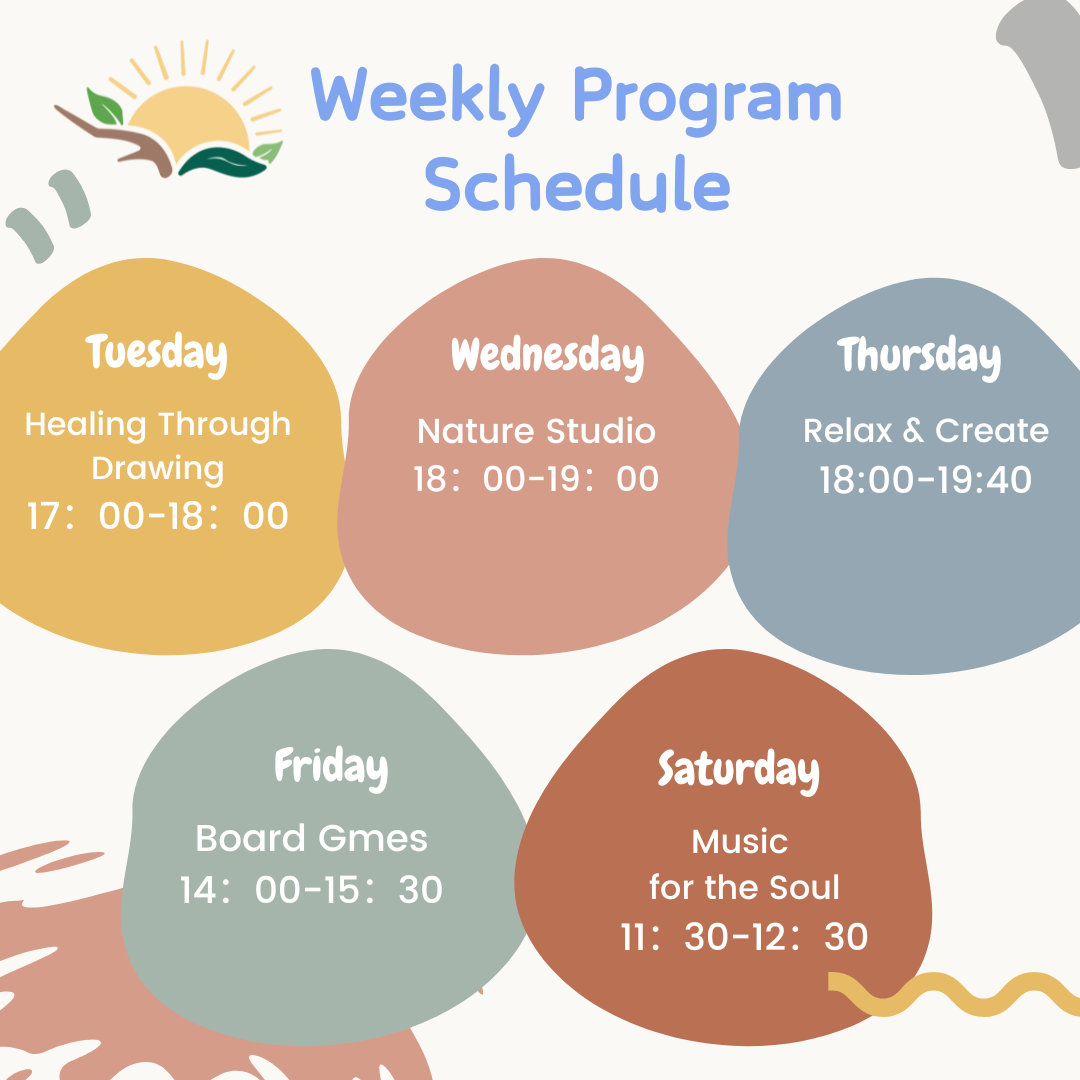Adolescent Support Programs
When adolescents face emotional struggles, internet addiction, school refusal, or overwhelming stress, they may not require hospitalization—but weekly outpatient visits alone often aren't enough.
To support teens who need more consistent care, we've developed a Flexible Intensive Outpatient Program (Flexible IOP).
Rooted in clinical evidence and tailored to the needs of Taiwanese adolescents, this program offers a flexible and diversified treatment structure that supports mental health without interrupting daily life or schooling.

Your Care Team
You – Your participation and commitment are the starting point for change.
Psychiatrist – A medical expert who provides diagnosis and medication support when needed.
Psychologist – A specialist in emotional exploration, cognitive restructuring, and behavioral guidance.
Personal Mind-Body Health Coach (Case Manager) – A daily check-in partner who helps track goals, plan routines, and build motivation for lasting growth.
This Program Combines Two Core Support Systems
1. Personal Mind-Body Health Coaching (Case Management)
Our case managers check in with the adolescent daily to track mood, routines, and learning goals. They help adjust daily objectives and guide the teen through stress management and relaxation techniques using multimedia materials.
Youth are encouraged to take part in setting goals and making decisions—gradually rebuilding structure around school and social life at their own pace.
2. Weekly Stress-Relief Activities (Flexible Participation)
We offer up to 5 activity sessions per week, including art making, music expression, board games, and nature crafts. Teens may join according to their interests and availability. These activities focus on emotional expression, self-exploration, and interpersonal skill development.
Recommended Participation
The typical intervention period lasts 4 to 12 weeks, adjustable based on individual needs.
We recommend that adolescents engage in both case management and activities within a 3-month period to establish a consistent and structured support system—shown to be most effective for emotional adjustment and lifestyle rebuilding.
➤ Individual therapy, group therapy, and medical consultations may also be included as needed (additional fees apply).
What Makes Our Program Unique
We want every child to grow in a way that feels safe, empowered, and meaningful. Through our approach, we aim to help them:
-
Build trust in a stable and supportive space—where they feel safe to speak and express themselves
-
Learn to face challenges instead of avoiding them
-
Reconnect with joy by engaging in activities they genuinely enjoy
-
Develop a sense of direction by practicing self-reflection and goal-setting
-
Shift from simply being told what to do, to making their own thoughtful choices—with growing inner motivation
Who Is This Program For?
This program is designed for adolescents who:
-
Experience depression, anxiety, or social withdrawal, but do not require hospitalization
-
Struggle with school refusal, internet addiction, or interpersonal difficulties
-
Have had limited progress with previous treatment and may benefit from a more intensive approach
-
Show signs of emotional distress following major changes at home, school, or in peer relationships
Family Support & Parent Collaboration
Parents are more than just bystanders—they deserve support too.
While your child is receiving intensive care, your role as a parent remains vital. If you're looking for guidance and emotional support along the way, we can refer you to parent consultation services to help you:
-
Better understand your child's current emotional state and behavioral changes
-
Explore more effective ways to communicate and parent
-
Reduce family conflict and strengthen a sense of teamwork within the home
To explore whether this program fits your child's needs, feel free to schedule a visit.
FAQ
1. I'm already in psychotherapy — do I still need a case manager?
Yes, a case manager can be a valuable addition to your care team. While your therapist focuses on emotional exploration and psychological support, a case manager helps you apply what you're working on in therapy to your daily life. They assist with setting realistic goals, building routines, managing stress, and staying on track—especially when you're navigating challenges outside of sessions. Together, both roles offer a more complete support system to help you grow and heal in real-world settings.
2. What if my child doesn't want to join the group activities? Can they just do case management?
Yes, participation in group activities is flexible. We respect each teen's readiness and current emotional state. While we encourage gradual engagement when possible—since activities help with social connection, confidence, and emotional expression—it's completely fine to start with just case management. Even without group involvement, steady progress can still be made through daily support and goal tracking with the case manager.
3. Will the case manager just keep reminding my child what to do? Will that feel stressful for them?
Not at all—our case managers are not here to pressure or constantly check up on teens. They act as supportive partners, helping the adolescent set small, achievable goals and offering encouragement along the way. Rather than pushing for results, the focus is on building motivation, structure, and a sense of direction. Many teens come to appreciate their case manager as "someone who checks in on me, but never forces me"—a reassuring presence in their day.
Weekly Activity Overview
Experiential Learning × Emotional Support

🎨 Healing Through Drawing — A Gentle Way to Process Emotions
Tuesdays | 5:00–6:00 PM
Instructor: Pei-Lun Tsai | M.F.A. in Visual Communication Design, National Yunlin University of Science and Technology
This non-verbal creative session invites teens to express emotions through simple lines and images—no artistic skills required. Each class begins with calming music and gentle stretches, followed by quiet drawing time to help students reconnect with themselves.
It's an opportunity to slow down, explore emotions safely, and restore inner calm through art.
🌿 Nature Studio — A Weekly Practice in Sustainable Creativity
Wednesdays | 6:00–7:00 PM
Instructor: Hsing-Tzu Yu | Ph.D. Candidate in Counseling Psychology, National Chengchi University
Using natural materials like leaves, wood, and stones, students engage in therapeutic handcrafting activities that promote emotional regulation and mindfulness.
This class fosters a sense of peer connection, environmental respect, and inner stillness—allowing creativity to become a bridge between self, community, and nature.
🖍 Relax & Create — Colored Pencil and Oil Pastel Drawing
Thursdays | 6:00–7:40 PM
Instructor: Wei Chen | M.F.A. Student in Fine Arts, Taipei National University of the Arts
In this class, students explore both colored pencils and oil pastels to create detailed semi-realistic illustrations.
Through focused drawing, they experience calm and healing, using colors as a tool to express and understand their emotions. Art becomes a quiet refuge in the middle of everyday life.
🎶 Music for the Soul — Play, Sing & Create
Saturdays | 11:30 AM–12:30 PM
Instructor: Kuei-Sheng Chen | Graduate of MI Guitar Institute of Technology (USA); 2nd Place, Fender Taiwan Guitar Competition 2013
Let music become an emotional outlet! Students can choose to play the guitar or ukulele, learn to perform their favorite songs, or explore digital music creation tools to compose their own tracks.
No music background is needed—just enthusiasm. Everyone is welcome to experience the freedom and joy that music brings.
